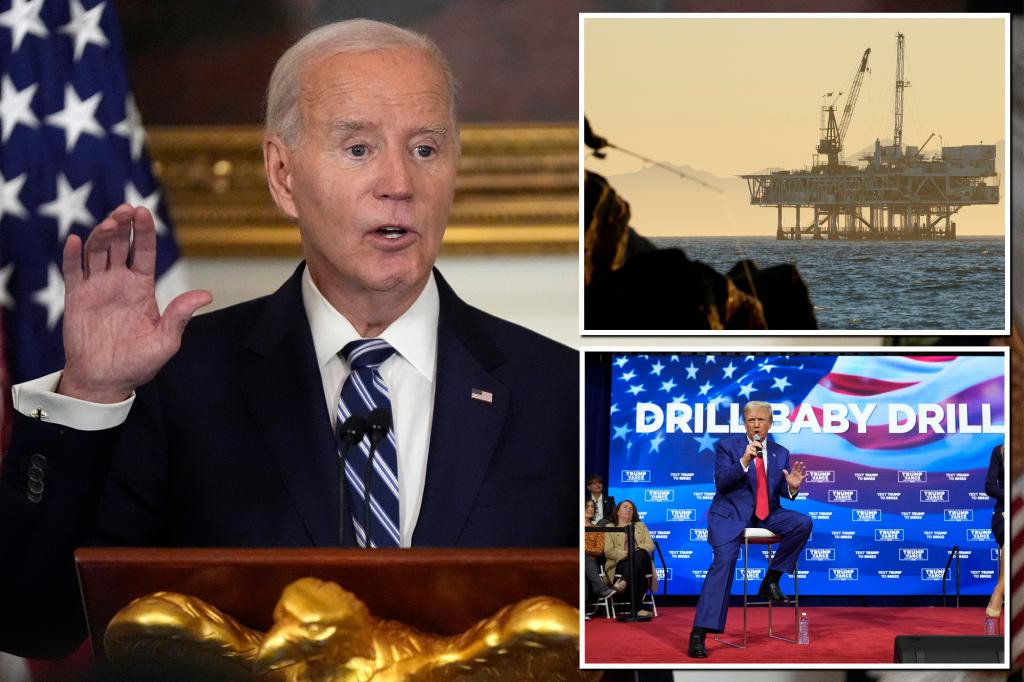President Biden, in the waning days of his administration, enacted a sweeping ban on new offshore oil and gas drilling across a significant portion of U.S. coastal waters. This move, utilizing his authority under the Outer Continental Shelf Lands Act, effectively shields vast stretches of the Pacific and Atlantic coasts, the eastern Gulf of Mexico, and parts of Alaska’s Northern Bering Sea from future fossil fuel extraction. Biden justified this decision by citing the potential for irreversible environmental damage to these ecologically sensitive areas, arguing that such drilling is unnecessary to meet national energy demands. He emphasized the importance of protecting these coastal regions for future generations in the face of the escalating climate crisis and the ongoing transition to cleaner energy sources. This action represents a significant step in prioritizing environmental protection and climate resilience over potentially lucrative, yet environmentally risky, fossil fuel development.
While the ban encompasses over 625 million acres of federal waters, it notably excludes large areas of the central and western Gulf of Mexico, the current hub of U.S. offshore drilling activities. This exclusion allows for continued exploitation of existing resources in this region while safeguarding vulnerable coastal ecosystems elsewhere. The impacted areas include coastlines along environmentally sensitive states like California and Florida, which have historically expressed strong opposition to offshore drilling due to concerns about potential oil spills and damage to their tourism-dependent economies. By focusing the ban on these specific areas, Biden aimed to strike a balance between energy security and environmental protection, acknowledging the existing economic reliance on offshore drilling while mitigating potential risks to fragile coastal ecosystems.
The protective measures enacted by Biden pose a significant hurdle for any future administration aiming to reverse course and expand offshore drilling. Repealing these protections would likely require congressional action, a lengthy and complex process that could face significant political resistance. This underlines the strategic nature of Biden’s move, effectively locking in these protections and making it more challenging for subsequent administrations to prioritize fossil fuel expansion over environmental preservation. This action aligns with a broader trend of increasing awareness and concern regarding the environmental impacts of fossil fuel extraction, particularly in sensitive coastal regions.
This decision stands in stark contrast to the previous administration’s stance on energy policy. While President Trump initially proposed a vast expansion of offshore drilling, he later retreated in the face of widespread public opposition, particularly in Florida. Despite this, Trump’s overall energy agenda focused on promoting American “energy dominance” through increased domestic oil and gas production, a position fundamentally at odds with Biden’s emphasis on climate change mitigation and the transition to renewable energy sources. This divergence highlights the ongoing political debate surrounding the balance between energy independence and environmental protection.
Environmental groups lauded Biden’s action as a major victory for ocean conservation, emphasizing the urgent need to curb greenhouse gas emissions by limiting fossil fuel development. They praised Biden for heeding the concerns of coastal communities and upholding a bipartisan tradition of safeguarding America’s coastlines. These communities recognize the economic and ecological importance of healthy oceans, which support vital industries like tourism, fishing, and recreation. By protecting these areas from the risks associated with offshore drilling, Biden’s action aims to preserve the long-term health and prosperity of these coastal economies.
Biden’s move builds upon a legacy of both Democratic and Republican presidents prioritizing the protection of coastal waters. He underscored the relatively minimal potential for fossil fuel extraction in the protected areas, arguing that the potential economic benefits do not outweigh the significant environmental, public health, and economic risks associated with drilling. This perspective reflects a growing recognition of the interconnectedness of environmental health and economic well-being, emphasizing the importance of sustainable resource management and the long-term consequences of environmental degradation. While the Trump administration criticized Biden’s decision as politically motivated and detrimental to American energy independence, Biden framed it as a crucial step towards a cleaner energy future and the preservation of invaluable coastal resources. This ongoing debate reflects the complex and often contentious intersection of energy policy, environmental protection, and economic interests.

